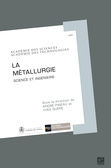Metallurgy, science and engineering, a joint Report by the French Academy of Sciences, and the National Academy of Technologies of France
Ed. EDP Sciences, January 2011
Jan.14, 2011
Moderators:
Prof. Yves QUERE, Member of the Academy of Sciences and Prof. André PINEAU, NATF Fellow.
Abstract:
If we can readily agree that the metallurgical industries are inevitably being reorganised into ‘world class’ sized entities, we must also do everything in our power to prevent this global trend weakening France’s position in this key sector. If the major French actors in the metallurgical sector cannot continue as they were able to do to recently, to draw on the excellent results of French public R&D and higher education schemes, they will simply move elsewhere, outside France. What would be worse in this event would be a loss of ‘substance’ that would seriously penalise France’s SME companies.
The National Academy of Technologies of France (NATF) and the French Academy of Sciences have decided to present their joint analysis of the current status in France, drafted by a group of experts moderated by Prof. André PINEAU, NATF Fellow and Prof. Yves QUERE, Member of the Academy of Sciences.
The analysis, which is a synthetic overview, completed with several digitised appendices, gives a first description of Metallurgy as a science, i.e., a science per se, with strong links to the engineering science, viz., metallurgical engineering. The joint academic group then establishes a status diagnosis, not only for the major industrial sectors concerned but also in the area of Research and Higher Education. The ambition we could entertain is that Metallurgy is recognised as a scientific speciality per se, among the numerous other fields in Industry where metallurgy is a source for progress and a reservoir for future employment; and likewise to draw attention to the fact that it takes time to build up the competences, whether scientific or technical, that can be destroyed so easily.
The Report also shows how Metallurgy in France has lost a large part of its substance, partly because of the multiple recent industrial reorganisation schemes and partly because the academic world is no longer attracted to this area, because metallurgy is not seen as “fashionable”. Urgent measures need to be taken in higher education and industrial research, in correctly informing the public at large, or making the actors and the policy makers aware of the issue at stake.
Given the seriousness of the trends observed, that impact notably and negatively on employment, on skills reservoirs, on R&D, … the two Academies propose that public and private policy makers adopt a strategy that the authors set out in a set of recommendations: the current status is given for each domain along with the directions that could be chosen to ensure scientific and applied development.
Were Franceto forego its pole position in Metallurgy would be dangerous; to seek to become a leader is a challenge that lies before us. We are now at this cross-road – and probably ‘condemned’ to succeed.

